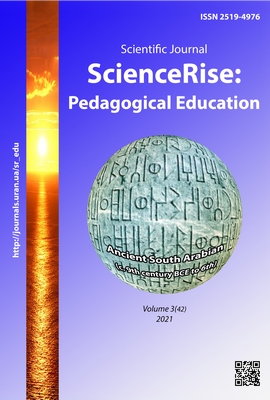Research of functioning of rural preschool institutions of Ukraine in the period from 1945 to 1963
DOI:
https://doi.org/10.15587/2519-4984.2021.232621Keywords:
preschool institutions, countryside, history of education, issues of periodizationAbstract
It is necessary to study the peculiarities of the functioning of preschool institutions in rural areas of Ukraine in the past. This gives an opportunity to see certain patterns and conventions, to identify positive experiences that were once rejected or forgotten, the opportunity to reveal how contemporaries, responded to such problems, what was the pedagogical argument and its implementation in practice. The historical facts of the organization of public preschool education in the Ukrainian village, which has its own rather complex, contradictory phenomena and processes, are generalized. The focus is on the periodization of the development of preschool institutions in the countryside of Ukraine in the chronological framework of 1945–1991. There are three periods of formation and development of rural preschools: I period (1945–1963) – the revival and formation of preschools in rural areas, II period (1963–1984) – the implementation of preschool education in rural preschools, III period (1984–1991) – renewal of the educational space of preschool institutions in rural areas. The subjective factor of the process of development of rural preschool institutions in Ukraine during the І period of the revival and formation of preschool institutions in rural areas is revealed (1945-1963). Prospects for further historical and pedagogical research in revealing the problem of implementing preschool education and updating the educational space in rural preschools of Ukraine are outlined
References
- Dichek, N. Transformations in the educational policy of Ukraine. National identity as a problem of science and education. Kyiv, 27–29. Available at: https://lib.iitta.gov.ua/721116/
- Berezivska, L. (2018). Pedahohichna istoriohrafiia: stan, problemy, vyklyky. Istoriohrafiia yak vazhlyvyi skladnyk doslidzhen z istorii osvity: yevropeiskyi i vitchyznianyi vymiry, 4–6. Available at: https://core.ac.uk/download/pdf/162002572.pdf
- Sukhomlynska, O. (2018). The use of the term history of modern times in the educational context (through the prism of foreign studies). Research and Educational Studies, 1, 10–18. doi: http://doi.org/10.32405/2663-5739-2018-1-10-18
- Gupan, N. (2016). Problems of chronology in modern researches on pedagogical history. Ukrainian pedagogical journa, 1, 116–121.
- Zaichenko, I. V. (2016). Pedagogy. Kyiv: Lira, 608.
- Ognevyuk, V. O. (2003). Osiahnennia osvity: pidsumky XX stolittia. Kyiv: Navchalna knyha, 111.
- Boiko, O. D. (2007). History of Ukraine. Kyiv: Akademvydav, 688.
- Protokoly zasidan vykonkomu Brusylivskoi raionnoi Rady deputativ trudiashchykh z 12.01.1945 po 30.12.1945 r. DAZhO, F. R-2969, op. 1 1944–1962, spr. 4a, ark. 206.
- Postanovleniya ispolkoma raysoveta deputatov trudyaschikhsya s 8.01.1945 po 11.10.1945 g. DAZHO, F. R-855, op. 2 1944–1961, spr. 8 ark. 369.
- Rishennia raivykonkomu Yemilchynskoi raionnoi rady deputativ trudiashchykh z 5 sichnia po 21 kvitnia 1949 r. DAZhO, F. R-631, op. 2 1944–1960, spr. 20 ark. 505.
- Richnyi zvit Chernihivskoho oblasnoho viddilu narodnoi osvity 1949–1950 n. r. TsAVOVU F. 166, op. 15 1942–1980, spr. 879, ark. 61.
- Richnyi zvit pro robotu doshkilnykh zakladiv za 1947–1948 n. r. DASO, F. R-3552, op. 2, spr. 11, ark. 24.
- Prohramno-metodychni vkazivky dlia vykhovatelia dytiachoho sadka (1947). Kyiv: Radianska shkola, 172.
- Protokol No. 65 zasedaniya Arkhitekturnogo soveta pri nachalnike Upravleniya po delam arkhitektury pri Sovete Ministrov URSR 19 iyulya 1951 g. TSDAVOVU Ukraini, F. R-4906, op. 1 1943–1992, spr. 3340, ark. 98.
Downloads
Published
How to Cite
Issue
Section
License
Copyright (c) 2021 Liudmyla Melenets

This work is licensed under a Creative Commons Attribution 4.0 International License.
Our journal abides by the Creative Commons CC BY copyright rights and permissions for open access journals.
Authors, who are published in this journal, agree to the following conditions:
1. The authors reserve the right to authorship of the work and pass the first publication right of this work to the journal under the terms of a Creative Commons CC BY, which allows others to freely distribute the published research with the obligatory reference to the authors of the original work and the first publication of the work in this journal.
2. The authors have the right to conclude separate supplement agreements that relate to non-exclusive work distribution in the form in which it has been published by the journal (for example, to upload the work to the online storage of the journal or publish it as part of a monograph), provided that the reference to the first publication of the work in this journal is included.







